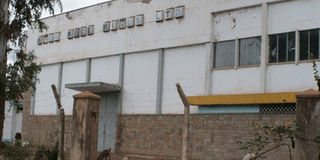Mwea Rice Mills set to be revived

The defunct Mwea Rice Mills in Kirinyaga county. The government is set to revive the facility to improve rice production. PHOTO/FILE
What you need to know:
- The mills closed in 1998 when farmers revolted and refused to deliver their rice citing exploitation by the National Irrigation Board which used to market their produce.
- These mills are 46 years old and need to be modernised for them to operate effectively.
- Farmers should also be convinced on the importance of using the mills because they are shareholders
The multimillion Mwea Rice Mills which has been lying idle for more than a decade will be revived.
This has been said by the Agriculture Principal Secretary, Sicily Kariuki.
She said a team of technical officers from the ministry will work out modalities of re-opening the mills.
"I shall meet with the technical team and discuss the revival of this crucial facility which the government heavily invested in," she said.
She was speaking Thursday when she paid a courtesy call on the Kirinyaga County Governor Mr Joseph Ndathi at his Kutus office.
COMMITTED
Ms Kariuki said the government was fully committed to ensure that the abandoned mills were operational in order to generate income.
The PS was responding to complaints by the governor that the mills which were meant to create employment and generate income were not in good working condition.
Mr Ndathi told the PS to intervene as taxpayers' money was used to put up the mills.
The Governor observed that out of the four mills constructed back in 1967 to process rice from the expansive Mwea Irrigation Scheme, only one was operational.
The mills closed in 1998 when farmers revolted and refused to deliver their rice citing exploitation by the National Irrigation Board which used to market their produce.
During the revolt, two farmers were shot dead and scores injured.
Since then the mills closed and farmers vowed to continue marketing their produce through their Mwea Rice Growers Multipurpose Cooperative Society.
TOURED MILLS
Later, the PS toured the mills and underscored the need for proper management of the facilities.
The mills manager John Juma told the PS that the lost glory of the mills could be restored if they were modernised and farmers agreed to deliver their produce there.
"These mills are 46 years old and need to be modernised for them to operate effectively.
Farmers should also be convinced on the importance of using the mills because they are shareholders," he said.
RICE IMPORTS
Earlier, the PS expressed concern over the increasing rice imports.
She observed that the market was flooded with rice imports which affected local rice farmers.
The PS said the country produced only 100,000 tons of rice while 400,000 tons are consumed locally.
Ms Kariuki said the deficit is imported to cater for rising demand for rice.
She said Kenya had the potential to produce enough rice for consumption and extra for export and called on the farmers to work hard.
"It is sad that we are importing more than 70% of rice yet we have the potential to produce it. This is unacceptable," she said.
Ms Kariuki said the government was expanding rice farming in Mwea at a cost of Sh12 billion to enhance food security and discourage cheap imports which were hurting local farmers.
"Once this project is completed we shall be able to have self-sufficiency in rice production," she said.





